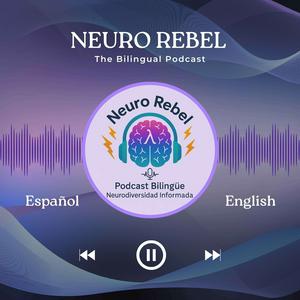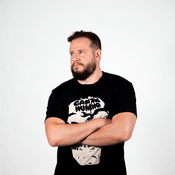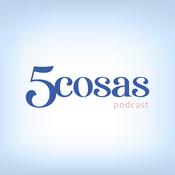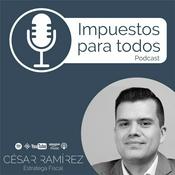34 episodios
Diagnóstico Autista Después de los 50: Cómo Reconstruir Identidad y Crear Comunidad
02/2/2026 | 52 minSend us a text
Cincuenta años navegando el mundo sin el mapa que tu cerebro necesitaba. Cinco décadas siendo invisible para sistemas que no fueron diseñados para verte. ¿Y entonces llega el diagnóstico autista? Bienvenida al territorio que miles de mujeres mayores de 50 conocen demasiado bien.
Este episodio inaugura "Voces Rebeldes," nuestra nueva serie dedicada a amplificar las voces de quienes construyen comunidad cuando los sistemas establecidos nos fallan. Conversamos con María Fernanda Altamirano, cantante y artista visual de Córdoba, Argentina, quien recibió su diagnóstico autista a los 50 y tantos años y decidió no esperar más.
En este episodio exploramos:
Cómo se vive el diagnóstico autista en la adultez tardía y qué palabras usábamos para nombrarnos antes de tener el lenguaje que necesitábamos
Por qué las mujeres autistas mayores de 50 seguimos siendo invisibles en las conversaciones sobre neurodiversidad—y qué costos estructurales tiene esa invisibilidad
El arte como supervivencia: cómo la creatividad funciona como ancla cuando todo lo demás se vuelve demasiado
Cómo crear comunidad neurodivergente cuando los recursos no existen: metodología práctica y replicable para construir tus propios espacios de pertenencia
"Honrar la Vida" de Eladia Blázquez: un momento musical sobre resistencia, duelo y seguir adelante
Si eres mujer mayor de 50 que sospecha ser autista, si has estado invisible durante décadas, si alguna vez pensaste que ya era demasiado tarde: este episodio es tu prueba de que no lo es. Nunca es demasiado tarde para descubrirte. Nunca es demasiado tarde para encontrar tu voz. Nunca es demasiado tarde para construir comunidad.
Support the show
Thank you for listening to Neuro Rebel — the bilingual podcast where we flip the script on what it means to think differently. I’m your host, Anita: autistic, gifted, and a retired law professor on a mission to bring rigor, empathy, and a dash of rebellion to conversations about neurodiversity.
🔍 What we do:
Each week, we blend evidence-based deep dives, solo reflections, and candid interviews with researchers and lived-experience experts. Expect English ↔ Español segments, sharp wit, real stories and actionable insights you can share with friends, colleagues, and classrooms.
🎧 Stay connected:
• Subscribe on Apple Podcasts, Spotify, Pocket Casts, or wherever you listen.
• 📲 Follow us on Instagram and TikTok @neurorebelpodcast for bonus clips, show notes, and community prompts.
• 💌 Join our mailing list at https://www.neurorebelpodcast.com for episode transcripts, resource guides, and early access to live Q&As.
🤝 Support the show:
If Neuro Rebel sparks new questions, challenges assumptions or simply makes you feel seen, please tell a friend or leave a rating—it means the world. You can also support us directly with a one-time donation or “buy me a coffee” at www.neurorebelpodcast.com/support Your generosity keeps this project fiercely independent, bilingual, and free of corporate agendas.
⚠️ Disclaimer:
Opinions expressed here are mine alone and do not constitute professional...- Send us a text
¿Cuándo exactamente se volvió medible el ser humano? ¿Quién decidió que "normal" era un estándar contra el cual algunos merecen existir y otros no?
En este episodio inaugural de la Temporada 2, converso con Ernesto Reaño - psicólogo, lingüista, fundador de EITA en Lima, Perú, y una de las voces más importantes del paradigma de la neurodiversidad en América Latina.
Rastreamos la genealogía de "lo normal" desde un astrónomo belga en el siglo XIX (Adolphe Quetelet y su "hombre promedio") hasta las clínicas de ABA que hoy se multiplican en toda América Latina. Hablamos de por qué familias desesperadas pagan fortunas por terapias que el Departamento de Defensa de Estados Unidos declaró inefectivas. Y nos preguntamos: si sabemos todo esto, ¿por qué seguimos actuando como si no lo supiéramos?
EXPLORAMOS:
• La genealogía histórica de "normalidad" y su conexión con el colonialismo
• Por qué ABA persiste a pesar de la evidencia científica que demuestra su ineficacia
• El estudio del Departamento de Defensa: 70% sin mejora, 28% empeoró
• América Latina como el nuevo mercado para una industria que colapsa en Estados Unidos
• Práctica neuro-afirmativa: qué construimos en lugar de la normalización
• Esperanza concreta desde el terreno
Ernesto Reaño es autista, fundador del Equipo de Investigación y Trabajo en Autismo (EITA), con maestría en Ciencias del Lenguaje por la Sorbonne Nouvelle y candidato a doctor en Lingüística por la Universidad de Zaragoza. Fue invitado a la ONU en 2019 como ponente sobre comunicación como derecho humano. Autor de tres libros sobre autismo y neurodiversidad.
Show notes completos en nuestro sitio web: www.neurorebelpodcast.com
Support the show
Thank you for listening to Neuro Rebel — the bilingual podcast where we flip the script on what it means to think differently. I’m your host, Anita: autistic, gifted, and a retired law professor on a mission to bring rigor, empathy, and a dash of rebellion to conversations about neurodiversity.
🔍 What we do:
Each week, we blend evidence-based deep dives, solo reflections, and candid interviews with researchers and lived-experience experts. Expect English ↔ Español segments, sharp wit, real stories and actionable insights you can share with friends, colleagues, and classrooms.
🎧 Stay connected:
• Subscribe on Apple Podcasts, Spotify, Pocket Casts, or wherever you listen.
• 📲 Follow us on Instagram and TikTok @neurorebelpodcast for bonus clips, show notes, and community prompts.
• 💌 Join our mailing list at https://www.neurorebelpodcast.com for episode transcripts, resource guides, and early access to live Q&As.
🤝 Support the show:
If Neuro Rebel sparks new questions, challenges assumptions or simply makes you feel seen, please tell a friend or leave a rating—it means the world. You can also support us directly with a one-time donation or “buy me a coffee” at www.neurorebelpodcast.com/support Your generosity keeps this project fiercely independent, bilingual, and free of corporate agendas.
⚠️ Disclaimer:
Opinions expressed here are mine alone and do not constitute professional... - Send us a text
¿Qué sucede cuando el burnout autista te obliga a reconstruirte desde cero? En este episodio profundo, converso con Montserrat "Monky" Draco: artista multidisciplinaria, encuadernadora, tarotista y practicante de magia del caos, sobre su viaje desde el colapso total hasta la autenticidad radical. Monky comparte cómo la magia del caos, un sistema filosófico que trata las creencias como herramientas temporales, se convirtió en su marco para desmantelar el condicionamiento neurotípico, confrontar el capacitismo internalizado, y reconstruir una identidad que honra su neurología autista. EXPLORAMOS: - El burnout autista como punto de ruptura y renacimiento - Paralelismos entre desenmascaramiento autista y "desacondicionamiento" - Shadow work: integrar partes rechazadas del ser - Cartas al yo pasado como práctica de sanación - La máscara como herramienta consciente vs. prisión inconsciente - Reclamar el hiper-enfoque autista como fortaleza - El tarot como tecnología para hacerse las preguntas correctas Esta NO es una conversación sobre si la magia es "real"—es una exploración de cómo los sistemas de creencias funcionan como andamiaje psicológico para la reconstrucción de identidad post-diagnóstico.
QUOTES DESTACADOS: "Lo que estás percibiendo es real. Es válido. Si lo sientes y lo ves, es tuyo." - Monky "Entender tu neurodivergencia no es descubrir una falta—es un camino de poder." - Monky "Entre más desenmascaró, más me doy cuenta de quiénes me quieren genuinamente, no a mi máscara."
CONECTA CON MONKY: TikTok/Instagram: @tarotista.autista
Recursos e Investigación completa: https://www.neurorebelpodcast.com/
Support the show
Thank you for listening to Neuro Rebel — the bilingual podcast where we flip the script on what it means to think differently. I’m your host, Anita: autistic, gifted, and a retired law professor on a mission to bring rigor, empathy, and a dash of rebellion to conversations about neurodiversity.
🔍 What we do:
Each week, we blend evidence-based deep dives, solo reflections, and candid interviews with researchers and lived-experience experts. Expect English ↔ Español segments, sharp wit, real stories and actionable insights you can share with friends, colleagues, and classrooms.
🎧 Stay connected:
• Subscribe on Apple Podcasts, Spotify, Pocket Casts, or wherever you listen.
• 📲 Follow us on Instagram and TikTok @neurorebelpodcast for bonus clips, show notes, and community prompts.
• 💌 Join our mailing list at https://www.neurorebelpodcast.com for episode transcripts, resource guides, and early access to live Q&As.
🤝 Support the show:
If Neuro Rebel sparks new questions, challenges assumptions or simply makes you feel seen, please tell a friend or leave a rating—it means the world. You can also support us directly with a one-time donation or “buy me a coffee” at www.neurorebelpodcast.com/support Your generosity keeps this project fiercely independent, bilingual, and free of corporate agendas.
⚠️ Disclaimer:
Opinions expressed here are mine alone and do not constitute professional... El Juicio de 7 Segundos: Por qué Los Neurotípicos Rechazan a Las Personas Neurodivergentes
04/11/2025 | 58 minSend us a text
¿Sabías que las personas neurotípicas forman juicios negativos sobre individuos autistas, con TDAH y superdotados en solo siete segundos: antes de cualquier interacción significativa?
En este episodio revolucionario examinamos la ciencia del sesgo neurotípico instantáneo. Basándonos en investigación de la Universidad de Nottingham y estudios seminales, revelamos cómo juicios rápidos escalan hacia exclusión sistemática en empleo, educación y relaciones sociales.
Exploramos el "Problema de la Doble Empatía" de Damian Milton: las acusaciones de que personas autistas "carecen de empatía" son proyecciones de fallas empáticas neurotípicas. La investigación es clara—la comunicación autista-a-autista fluye naturalmente. El problema no somos nosotros.
Descubre:
• Cómo juicios instantáneos operan más rápido que la conciencia
• Por qué eliminar señales audiovisuales elimina el sesgo completamente
• Cómo un sesgo de siete segundos se convierte en opresión estructural
• Qué es la injusticia epistémica y cómo se descuenta el testimonio neurodivergente
Pero hay esperanza: cuando personas neurotípicas reciben educación sobre neurodivergencia, los juicios negativos desaparecen—o se revierten. Examinamos tres casos exitosos: desmedicalización de homosexualidad, Movimiento de Derechos de Discapacidad y colapso de eugenesia.
Para neurodivergentes que necesitan validación: y para aliados comprometidos a desmantelar sesgos automáticos.
No lo imaginas. No eres responsable de prejuicios ajenos. Tu cerebro neurodivergente no está roto: el mundo que no puede acomodarte lo está.
Transcripción completa con 40+ referencias académicas en nuestro sitio web: www.neurorebelpodcast.com
Support the show
Thank you for listening to Neuro Rebel — the bilingual podcast where we flip the script on what it means to think differently. I’m your host, Anita: autistic, gifted, and a retired law professor on a mission to bring rigor, empathy, and a dash of rebellion to conversations about neurodiversity.
🔍 What we do:
Each week, we blend evidence-based deep dives, solo reflections, and candid interviews with researchers and lived-experience experts. Expect English ↔ Español segments, sharp wit, real stories and actionable insights you can share with friends, colleagues, and classrooms.
🎧 Stay connected:
• Subscribe on Apple Podcasts, Spotify, Pocket Casts, or wherever you listen.
• 📲 Follow us on Instagram and TikTok @neurorebelpodcast for bonus clips, show notes, and community prompts.
• 💌 Join our mailing list at https://www.neurorebelpodcast.com for episode transcripts, resource guides, and early access to live Q&As.
🤝 Support the show:
If Neuro Rebel sparks new questions, challenges assumptions or simply makes you feel seen, please tell a friend or leave a rating—it means the world. You can also support us directly with a one-time donation or “buy me a coffee” at www.neurorebelpodcast.com/support Your generosity keeps this project fiercely independent, bilingual, and free of corporate agendas.
⚠️ Disclaimer:
Opinions expressed here are mine alone and do not constitute professional...- Send us a text
Research shows neurotypical people form negative judgments about autistic, ADHD, and gifted individuals in seven seconds: snap judgments that scale into lifetime systematic exclusion.
Drawing on University of Nottingham studies, we reveal how thin-slice judgments operate faster than consciousness. When audio-visual cues are removed, negative bias disappears, proving neurotypical prejudice targets communication style, not substance.
We investigate the Double Empathy Problem: accusations that autistic people "lack empathy" are projections of neurotypical failures. Research proves neurotypical people struggle to read autistic emotions, yet blame autistic people for communication breakdown.
Learn how seven-second cognitive bias becomes institutional oppression through "epistemic injustice:" systematic devaluation of neurodivergent testimony. From job interviews to healthcare to criminal justice, thin-slice judgments prevent contact needed to challenge prejudice.
But there's hope: Education works. When neurotypical people learn about neurodivergence before judging, negative bias disappears or reverses. Knowledge interventions override automatic prejudice.
We examine how marginalized communities defeated conceptual strongholds: demedicalization of homosexuality, disability rights Social Model, eugenics collapse. The neurodiversity movement deploys these strategies now.
For neurodivergent listeners: You're not imagining it. Documented bias.
For neurotypical listeners: You have unconscious prejudice. Here's how to override it.
Full citations, transcript, extended bibliography at www.neurorebelpodcast.com
Content warnings: discrimination, social rejection, systemic bias.
Support the show
Thank you for listening to Neuro Rebel — the bilingual podcast where we flip the script on what it means to think differently. I’m your host, Anita: autistic, gifted, and a retired law professor on a mission to bring rigor, empathy, and a dash of rebellion to conversations about neurodiversity.
🔍 What we do:
Each week, we blend evidence-based deep dives, solo reflections, and candid interviews with researchers and lived-experience experts. Expect English ↔ Español segments, sharp wit, real stories and actionable insights you can share with friends, colleagues, and classrooms.
🎧 Stay connected:
• Subscribe on Apple Podcasts, Spotify, Pocket Casts, or wherever you listen.
• 📲 Follow us on Instagram and TikTok @neurorebelpodcast for bonus clips, show notes, and community prompts.
• 💌 Join our mailing list at https://www.neurorebelpodcast.com for episode transcripts, resource guides, and early access to live Q&As.
🤝 Support the show:
If Neuro Rebel sparks new questions, challenges assumptions or simply makes you feel seen, please tell a friend or leave a rating—it means the world. You can also support us directly with a one-time donation or “buy me a coffee” at www.neurorebelpodcast.com/support Your generosity keeps this project fiercely independent, bilingual, and free of corporate agendas.
⚠️ Disclaimer:
Opinions expressed here are mine alone and do not constitute professional...
Más podcasts de Educación
Podcasts a la moda de Educación
Acerca de NeuroRebel Podcast
Why NeuroRebel?This isn't your typical neurodiversity podcast. Drawing from years of academic experience and personal lived experience, each episode is carefully crafted to provide substantive, science-backed information. Whether you're neurodivergent yourself, a family member, educator, or simply curious about how different brains work, you'll find content that challenges assumptions and deepens understanding.Bilingual AccessibilityEpisodes are available in both English and Spanish, making vital neurodiversity information accessible to broader communities. Because understanding your brain shouldn't depend on language barriers.Perfect ForNeurodivergent individuals seeking evidence-based informationParents and families navigating neurodivergenceEducators and professionals working with neurodivergent populationsAnyone interested in the science behind different ways of thinkingSpanish and English speakers looking for quality neurodiversity contentJoin the rebellion against misinformation and discover the fascinating world of neurodivergence through the lens of rigorous research and authentic lived experience.New episodes released weekly. Available in English and Spanish.
Sitio web del podcastEscucha NeuroRebel Podcast, FIESTA PARA DAÑADOS y muchos más podcasts de todo el mundo con la aplicación de radio.net

Descarga la app gratuita: radio.net
- Añadir radios y podcasts a favoritos
- Transmisión por Wi-Fi y Bluetooth
- Carplay & Android Auto compatible
- Muchas otras funciones de la app
Descarga la app gratuita: radio.net
- Añadir radios y podcasts a favoritos
- Transmisión por Wi-Fi y Bluetooth
- Carplay & Android Auto compatible
- Muchas otras funciones de la app


NeuroRebel Podcast
Escanea el código,
Descarga la app,
Escucha.
Descarga la app,
Escucha.

































